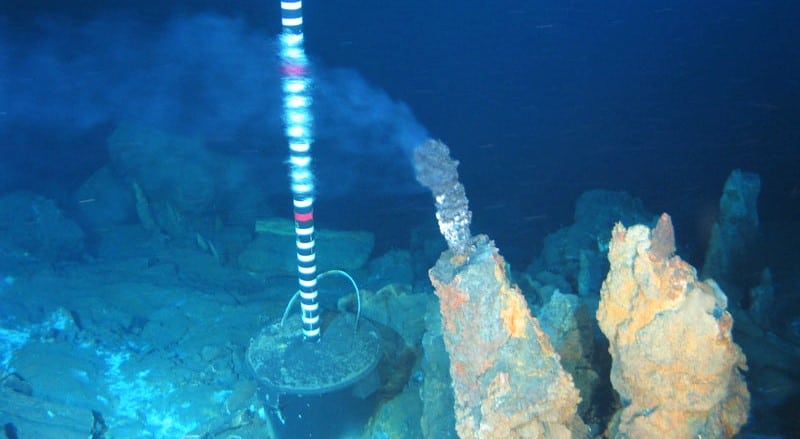There needs to be a regional approach to deep-sea mining, as opposed to relying solely on the sovereign rights of individual nations, given the transboundary risks such activities can pose to the Pacific Ocean, says a Cook Islands environmental group.
Te Ipukarea Society (TIS) has welcomed a decision by the Pacific Islands Forum Leaders’ for greater regional dialogue and cooperation on deep-sea minerals (DSM) at their recent meeting in Rarotonga.
However, a TIS spokesperson has criticised comments about respect for countries’ sovereignty on such issues.
During the 52nd Pacific Islands Forum Leaders Meeting held over a week ago, the 18 Pacific Island Forum Leaders:
*Acknowledged the significant interest in DSM among specific Members
*Reaffirmed their collective commitment to the health and resilience of the Blue Pacific Continent
*Recognised and respected the diversity of positions amongst (Pacific Islands Forum) Members on DSM development and sovereign decision-making
*Endorsed the convening of a Pacific Islands Forum Talanoa Dialogue in 2024, to be facilitated by the Secretariat, to facilitate open and inclusive discussion on DSM.
Prime Minister Mark Brown, who also chaired the meeting, in a statement said: “The cornerstone of our Pacific Islands Forum is respect for sovereignty, and our regional unity and collective advocacy and actions. This has amplified our voices and impact globally for decades and delivered transformative outcomes for our Pacific people.”
“As Forum Chair, I am deeply committed to ensuring that we continue to build our understanding of each other’s priorities and strengthen our solidarity. On issues in which we have differing views, it is important such discussions are convened in a constructive manner.
“The upcoming Talanoa Dialogue in 2024 will allow for inclusive preparations and ensure our collective voices and perspectives are accommodated. It will enable us to have this important discussion on deep sea minerals while presenting an opportunity for the Pacific Family to bring to the fore our global leadership once more on sustainable oceans management.”
Responding to PM Brown’s comments about respect for sovereignty and regional unity, a Te Ipukarea Society spokesperson said: “We must recognise the fact that activities such as deep sea mining in our waters can have significant impacts for our neighbours.”
“Sediment plumes can drift into neighbouring EEZs, the impacts of pollution from mining activities could affect tuna stocks, which are a migratory and regionally very significant resource. The potential damage from mining to our ocean’s ability to regulate climate change is also very much a regional concern. These are transboundary risks, and therefore our ‘sovereign’ decision making must ensure our neighbours, and the region as a whole, do not suffer because of our ‘sovereign rights’.”
The spokesperson added that there is also the consideration that, “when the Prime Minister refers to sovereignty, he is referring to what the powers within Government want, which is not necessarily what the people want”.
The spokesperson said this was made abundantly clear by the Government when they chose to change the term “public interest” to “national interest” when revising the legislation, “despite public objection to that change at the time of consultation”.
“We should also consider that the idea of sovereign rights over specific parts of our Moana nui o kiva is a relatively recent colonial construct. Our ancestors who have come before us have long recognised that the ocean is a shared taonga.
“We, as collective stewards of our ocean, have a shared responsibility for its health. We should therefore remember that even though what’s being proposed is specific to the Cook Islands EEZ, the unknown impacts would likely transcend borders and generations.”
TIS, the country’s first environmental NGO established in 1996, welcomed Brown’s comments that a constructive dialogue on deep-seabed minerals should be led by the regional countries, rather than external actors but said “he must realise that this should work both ways”.
“Government has for some time been employing overseas nationals, closely connected to the mining industry, funded by overseas sources, to assist them to progress their DSM agenda. In addition, the foreign exploratory licence holders have provided input into the Cook Islands seabed mining related regulations.”
“We look forward to the full involvement of the various national governments from the region, alongside Pacific Islands civil society, in the Talanoa Dialogue next year.”
Meanwhile, according to the Cook Islands Seabed Minerals Authority, a separate joint statement was delivered at the 28th International Seabed Authority Assembly meeting on 26 July by all 10 Pacific countries in attendance. These countries were: Australia, Cook Islands, the Federated States of Micronesia, Fiji, Kiribati, Nauru, New Zealand, Palau, the Kingdom of Tonga and Vanuatu.
In the joint statement, the Pacific countries acknowledged that while they may have differing positions on deep-sea mining (DSM), they are united in their commitment to protecting the ocean and marine environment. They expressed their openness to further discussions on this issue in the spirit of Talanoa, a traditional Pacific approach to dialogue and consensus-building.
The countries recognised the ocean as a single interconnected body of water that extends beyond jurisdictional boundaries, both within and beyond the Blue Pacific Continent. They emphasised the need for robust, environmentally sound rules, regulations, and procedures to govern DSM activities.
Seabed Minerals Commissioner Alex Herman commented on the joint statement, stating that it “reaffirmed our shared commitments towards ensuring the protection of our ocean and marine environment as it relates to DSM activities”.
Herman further noted that “there have been attempts to portray a deeply divided Pacific on the issue of DSM”.
“The constructive discussions amongst Pacific leaders on this issue as well as their agreement towards greater regional dialogue and cooperation counters that narrative.”
Last year, the Cook Islands granted three companies seabed mineral exploration licenses: Cook Islands Colbalt (CIC) Limited, Moana Minerals Limited, and Cook Islands Investment Company (CIIC) Seabed Resources Limited, which is co-owned by the Cook Islands government. These companies, which have operations around the world and share joint ownership with other mining companies, have budgeted between $55.4 million and $71.7 million to conduct exploration over the next five years.
